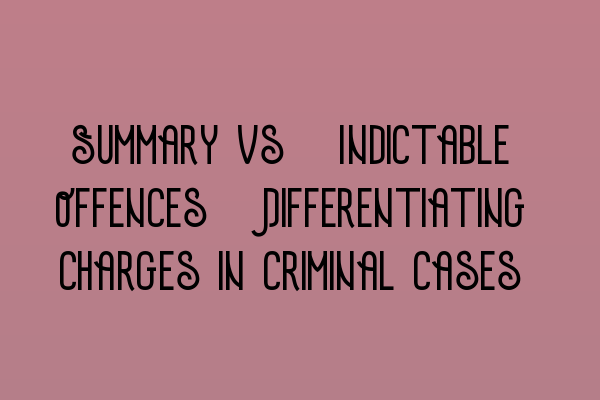Summary vs. Indictable Offences: Differentiating Charges in Criminal Cases
When it comes to criminal cases, it’s important to understand the difference between summary and indictable offences. These two types of charges have distinct characteristics, procedures, and potential penalties. As a solicitor at SQE Criminal Law & Practice Law UK, I often encounter clients who are confused about the nuances of these charges. In this blog post, I will break down the key differences between summary and indictable offences and explain how they affect the legal process.
Summary Offences
Summary offences are considered less serious crimes and are tried in the magistrates’ court. These offences typically include minor offenses that are punishable by fines, community service, or short prison sentences. Examples of summary offences include petty theft, public intoxication, and minor traffic violations.
Summary offences are usually dealt with swiftly and efficiently in the magistrates’ court. The proceedings are relatively informal, and the accused may not always require legal representation. However, it is still advisable to seek legal advice to ensure a fair trial and the best possible outcome.
In some cases, summary offences can be escalated to indictable offences if additional evidence is discovered or if the seriousness of the crime is reevaluated.
Indictable Offences
Indictable offences are more serious crimes and are tried in the Crown Court. These offences carry higher penalties and potential long-term imprisonment. Examples of indictable offences include murder, rape, fraud, and drug trafficking.
The legal process for indictable offences is more complex and formal compared to summary offences. The prosecution presents its case before a judge and jury, and the accused has the right to legal representation. The trial could involve lengthy examination of evidence, witness testimonies, and cross-examination.
In some cases, indictable offences may be downgraded to summary offences if the court deems it appropriate based on the circumstances of the case. This can happen if the evidence is insufficient or if the accused pleads guilty to a lesser charge.
Key Differences
The key differences between summary and indictable offences can be summarized as follows:
- Summary offences are less serious crimes tried in the magistrates’ court, whereas indictable offences are more serious crimes tried in the Crown Court.
- Summary offences are dealt with swiftly and efficiently, while indictable offences involve a more complex and formal legal process.
- Summary offences carry lighter penalties, such as fines or short prison sentences, while indictable offences can result in long-term imprisonment.
Seeking Legal Representation
Regardless of the type of charge you face, it is crucial to seek legal representation to ensure your rights are protected and your case is presented effectively. At SQE Criminal Law & Practice Law UK, our team of experienced solicitors is dedicated to providing expert advice and representation for both summary and indictable offences. We understand the intricacies of the legal system and will work tirelessly to achieve the best possible outcome for our clients.
If you require legal representation for your criminal case or if you have any further questions about summary or indictable offences, don’t hesitate to contact us for a consultation.
Related Articles:
- Legal Representation for Delaware LLCs in the UK: Expert Advice
- Legal Challenges for UK Businesses in the U.S.: Strategies for Overcoming Hurdles
- Legal Challenges for UK Businesses in the U.S.: Strategies for Overcoming Hurdles
- SQE Exam Prep: Essential Study Materials for Aspiring Solicitors
- Expert Testimonies in UK Courts: Building Strong Cases
